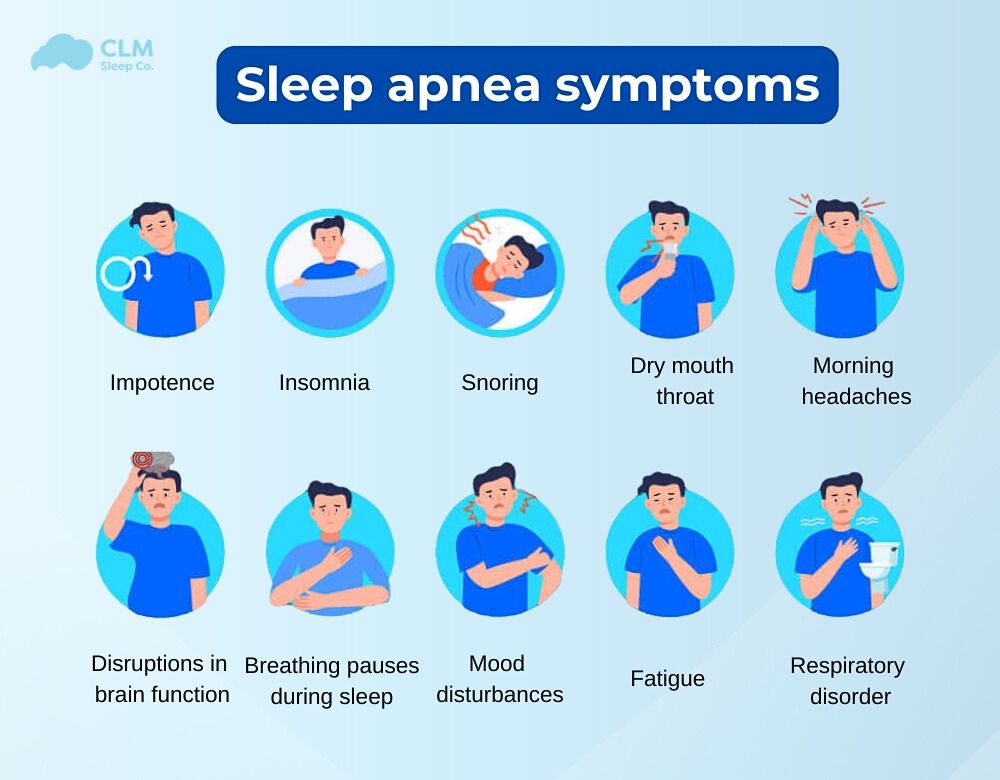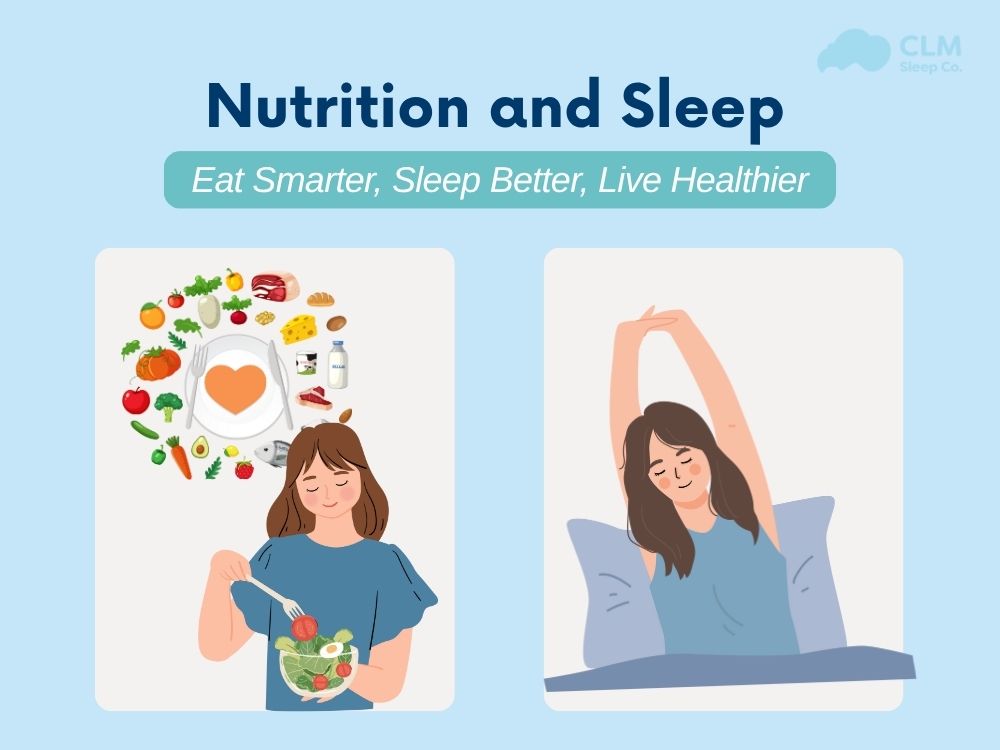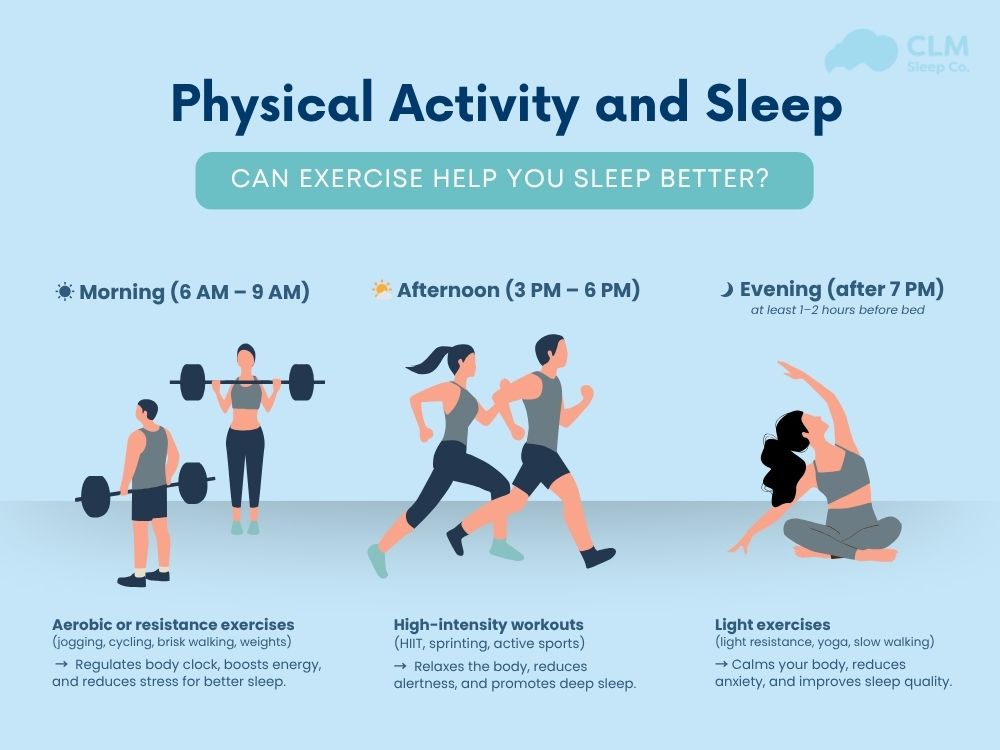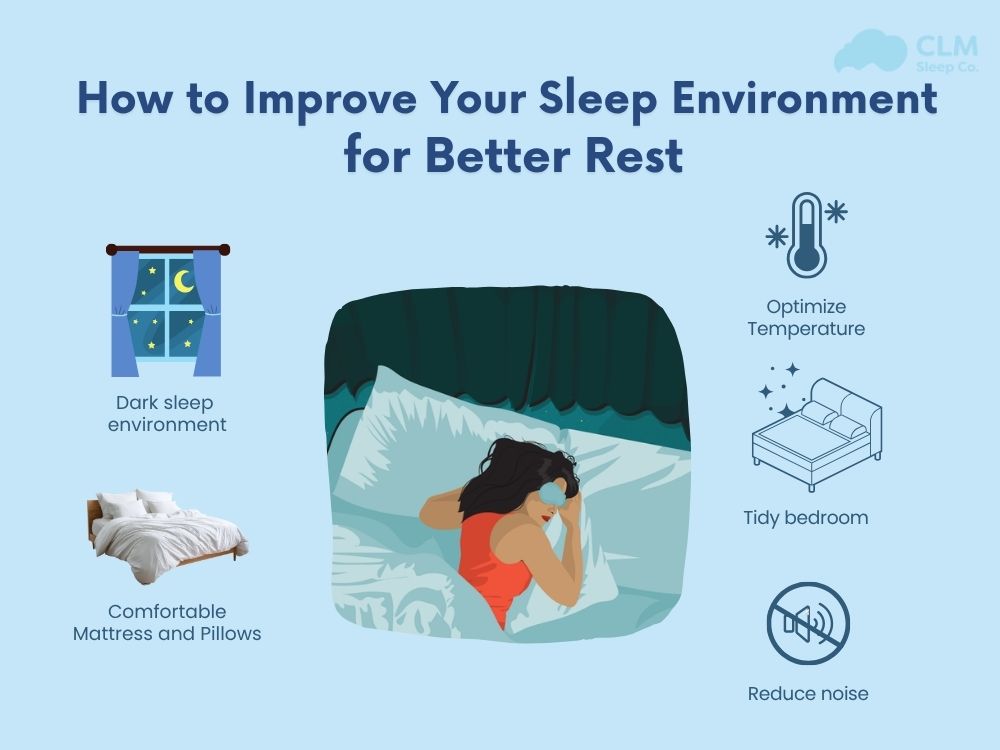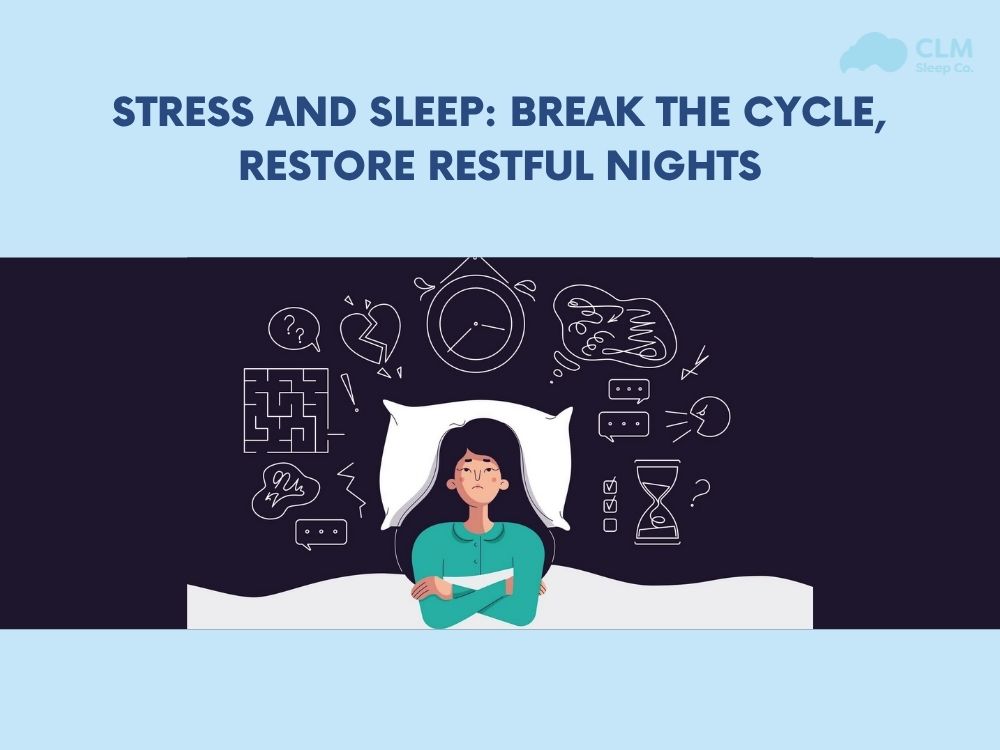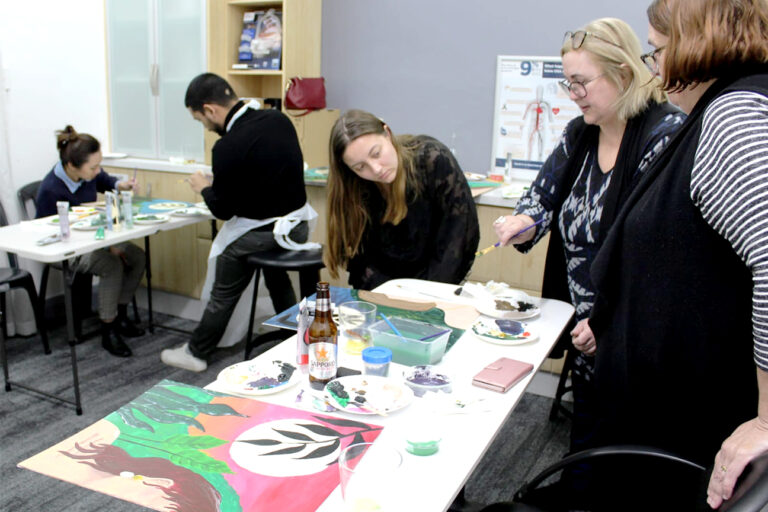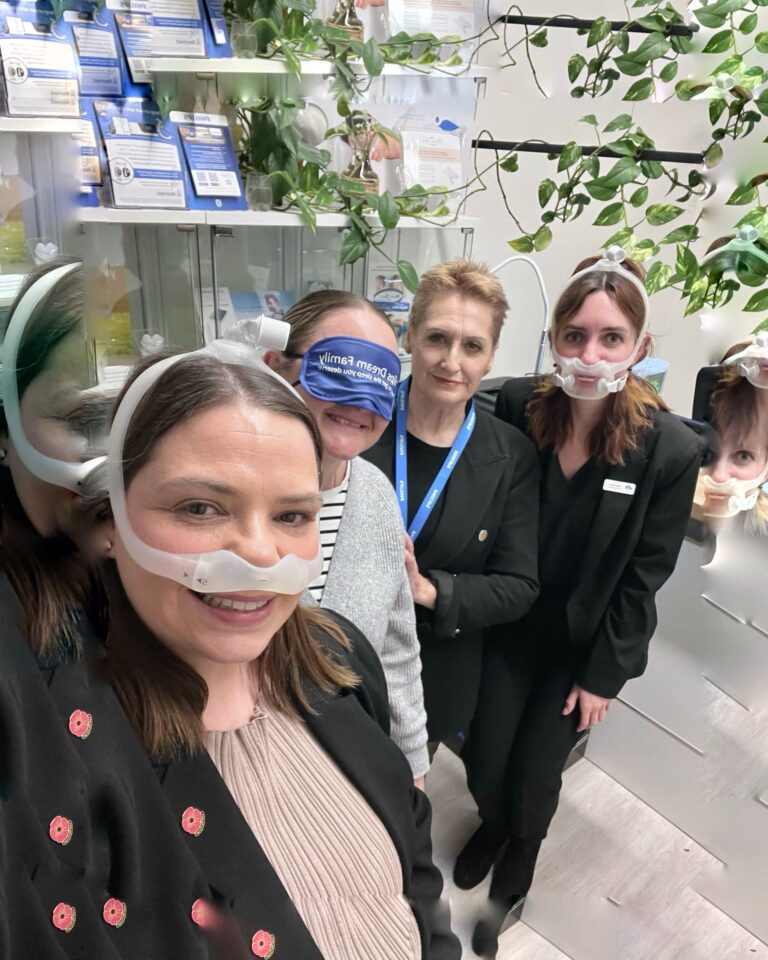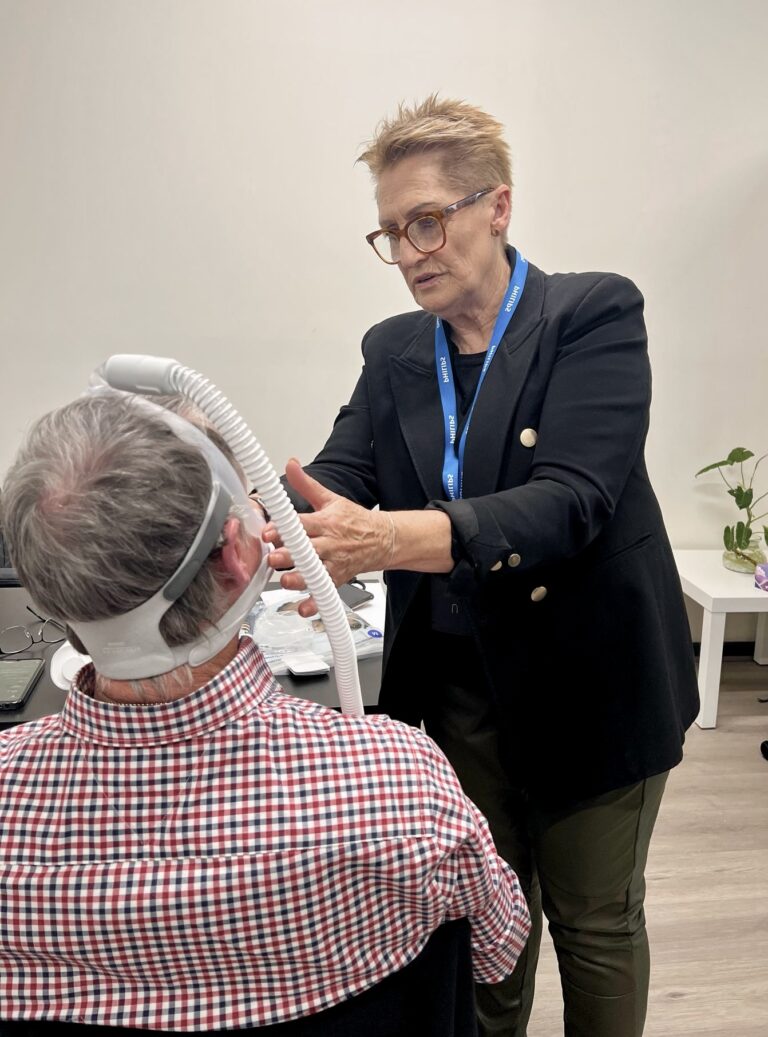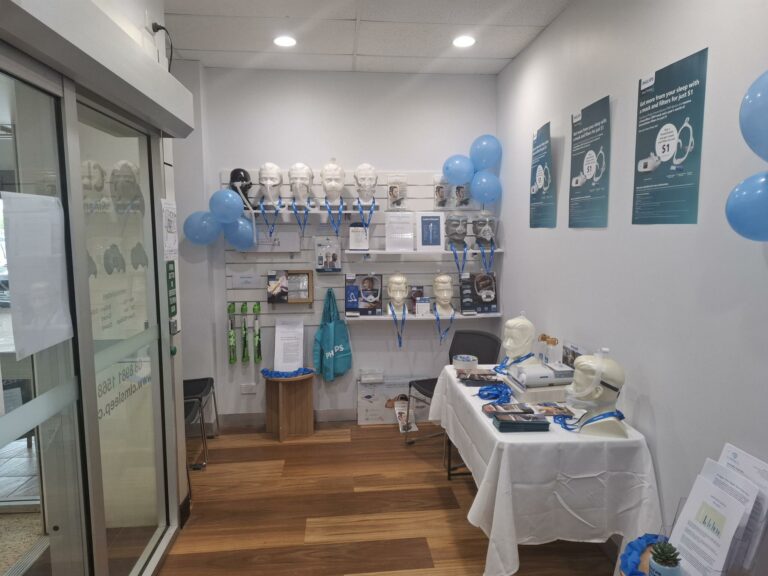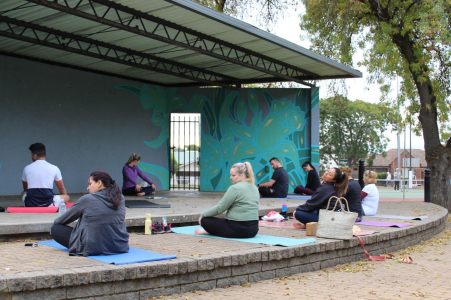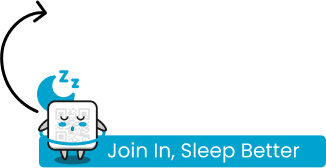Sleep apnea is a disorder that causes breathing interruptions during sleep. In such situations, your brain partially wakes you up to help you resume normal breathing, disrupting your restorative sleep. If left untreated, this sleep disorder can lead to serious health complications such as arrhythmias, heart failure, diabetes, or even stroke. However, the symptoms of sleep apnea are often difficult to recognize and easily overlooked, causing many people to only discover they have the condition when it has become severe. Therefore, let’s learn with CLM Sleep and better understand the sleep apnea symptoms at each level of severity. This can help you better understand your current condition and take appropriate actions to protect your health.
General Symptoms of Sleep Apnea
The main symptoms of sleep apnea are loud snoring, pauses in breathing while sleep, excessive daytime sleepiness, restless sleep, and difficulty concentrating. However, these are only initial symptoms, and they are likely to overlap, making it very difficult to distinguish. Therefore, it’s necessary to divide them into groups to better understand the symptoms and severity of sleep apnea you are experiencing. We can categorize the symptoms into groups according to severity level, symptoms that appear during sleep and after waking, types of sleep apnea, or the mechanism by which sleep apnea develops.
By severity
In the mild sleep apnea, snoring is often the earliest symptom to appear, accompanied by pauses in breathing lasting over 10 seconds. Other symptoms include difficulty falling asleep, restless sleep, feeling short of breath during sleep and excessive daytimes sleepiness
As the disease progresses to moderate sleep apnea, patients may experience additional symptoms such as gasping for air when waking up, choking or coughing during sleep, morning headaches, dry mouth or sore throat upon waking, difficulty concentrating and mood swings.
In cases of severe sleep apnea, the above symptoms become more pronounced and may be accompanied by serious respiratory problems. Some people experience Cheyne–Stokes breathing (CSB), which is often accompanied by arrhythmias and central respiratory disorders. Severe sleep apnea increases the risk of heart disease by 1.36 times, type 2 diabetes by 1.48 times, and stroke by 2.15 times.
The severity of sleep apnea is usually determined from a sleep study based on the AHI (Apnea-Hypopnea Index): mild sleep apnea, 5 ≤ AHI < 15; moderate sleep apnea, 15 ≤ AHI < 30; severe sleep apnea, AHI ≥ 30.
By Timing and Mechanism
Understanding the symptoms of sleep apnea based on their underlying causes can help you better visualize the condition and determine its severity as well as the most effective treatment. We can categorize these symptoms into four groups
- Breathing-related symptoms consist of snoring, breathing pauses, gasping for air, choking or coughing and cheyne–strokes breathing.
- Sleep quality–related symptoms include insomnia, restless sleep, frequent awakenings, non-restorative sleep
- Daytime symptoms comprise excessive daytime sleepiness, fatigue, morning headaches, dry mouth / sore throat upon waking, difficulty concentrating, and mood disturbances.
- Complications-related symptoms involve resistant hypertension, arrhythmia, heart failure, type 2 diabetes, and stroke.
See more: Sleep study Melbourne
Tables of Symptom Descriptions
| Breathing-related symptoms | |
| Symptom | Description |
| Snoring | Frequent, loud snoring during sleep |
| Breathing pauses | Temporary stops in breathing during sleep |
| Gasping for air | Sudden episodes of catching breath during sleep |
| Choking or coughing | Coughing or choking episodes during sleep |
| Cheyne–Stokes breathing | Irregular breathing with alternating periods of deep and shallow breaths. |
| Daytime symptoms | |
| Symptom | Description |
| Excessive daytime sleepiness | Persistent fatigue and drowsiness during the day, even after a full night’s sleep |
| Fatigue | General lack of energy and tiredness throughout the day. |
| Difficulty concentrating | Difficulty concentrating, memory issues, or cognitive impairment. |
| Mood disturbances | Irritability, mood swings, or depression. |
| Morning headaches | Headaches upon waking, especially in the morning. |
| Dry mouth / sore throat upon waking | Dryness or soreness in the mouth or throat upon waking. |
| Sleep quality–related symptoms | |
| Symptom | Description |
| Insomnia and restless sleep | Difficulty falling or staying asleep, with frequent tossing, turning, and awakening |
| Frequent awakenings | Waking multiple times during the night |
| Non-restorative sleep | Feeling unrefreshed despite sufficient sleep duration. |
| Nocturia | The person wakes up one or more times at night to urinate, disrupting sleep |
| Complications-related symptoms | |
| Symptom | Description |
| Resistant hypertension | High blood pressure that is difficult to control |
| Arrhythmia | Irregular heartbeats |
| Heart failure | Compromised heart function |
| Type 2 diabetes | Increased risk due to insulin resistance associated with chronic sleep disruption. |
| Stroke | Increased risk of cerebrovascular events from prolonged hypoxia and cardiovascular strain. |
Breathing-related symptoms
This is a group of symptoms that occur in both obstructive sleep apnea and central sleep apnea, directly related to apnea, reduced oxygen levels, or irregular breathing.
Snoring
One of the most common symptoms of sleep apnea is snoring, which occurs in at least 80% of people with sleep apnea. This symptom primarily occurs in OSA patients, while it is rarely seen in CSA patients. Snoring is the sound produced when tissues in the throat vibrate as airflow through the mouth and nose is obstructed.
Unlike regular snoring, which is soft, steady, and uninterrupted, snoring in people with OSA is often louder, irregular, and may be accompanied by gasping, wheezing, or choking sounds. The more severe the sleep apnea, the louder, more irregular the snoring, and the longer the pauses. To determine the severity, snoring can also be analyzed based on the sound of the snoring, the intensity of the snoring sound, the duration of breathing pauses, and some other accompanying signs.
- Mild sleep apnea: snoring is not too loud (~50–60 dB), accompanied by short pauses in breathing of about 10 seconds, sometimes with wheezing.
- Moderate sleep apnea: loud snoring (~60–70 dB) and irregular, with breathing pauses lasting from 10 to 30 seconds, along with gasping.
- Severe sleep apnea: very loud snoring (>80 dB) and harsh, with apnea events more frequent and longer than 30 seconds, followed by strong gasping after each apnea
See more: Can You Have Sleep Apnea Without Snoring?
Breathing pauses
Breathing pauses are a characteristic symptom that occurs in all patients with sleep apnea. Breathing pauses (apnea and hypopnea) are periods of temporary cessation of breathing or reduced respiration with:
- Apnea: complete cessation of breathing ≥10 seconds
- Hypopnea: Partial reduction of breathing ≥30% compared to normal, accompanied by a ≥3–4% decrease in oxygen or brief awakenings.
Breathing pauses occur due to two main reasons: airway obstruction and the brain not sending signals to the respiratory organs. In mild sleep apnea, the patient often doesn’t recognize the symptoms. But family members may notice them through snoring that is intermittent, sometimes loud, sometimes soft, with pauses in breathing lasting over 10 seconds before snoring resumes. In moderate and severe sleep apnea, breathing pauses often cause patients to startle awake because the body triggers a reflex to resume breathing when oxygen levels drop and CO₂ levels rise.
Gasping for air
Gasping for air is a phenomenon where a patient suddenly takes a deep breath and wakes up with a start due to a feeling of suffocation when the airway is obstructed during sleep. This is a common symptom of obstructive sleep apnea (OSA).
During sleep, the airway can become narrow or completely blocked (due to the tongue falling back, soft tissue collapse, or relaxed respiratory muscles). Therefore, the airflow into the lungs is also obstructed, causing a significant decrease in blood oxygen levels. When there is a lack of oxygen in the blood, the brain sends signals to wake the body up to breathe harder, leading to gasping for air. It’s easy to know if you’re gasping for air or not, some of the symptoms are:
- Suddenly waking up with a feeling of suffocation or lack of oxygen
- A sense of panic
- Rapid heartbeat
- Try to take a deep breath as soon as you wake up.
Choking or coughing
Choking or coughing in sleep apnea is a sudden shortness of breath that wakes the patient, accompanied by a strong cough or the need to take a deep breath immediately upon waking due to a sensation of suffocation. This symptom occurs mainly due to airway obstruction during sleep. Choking or coughing doesn’t appear immediately, but rather when apnea causes blood oxygen levels to drop, forcing the brain to trigger a reflex to wake the body up to breathe again. This symptom causes continuous sleep disruption, reducing the restorative quality of sleep due to decreased time in deep sleep and REM sleep.
Cheyne-Stokes breathing
Cheyne–Stokes breathing is a breathing disorder with a repeating cycle that is quite rare and accounts for fewer than 10% of all sleep apnea cases. This condition is common in patients with moderate to severe central sleep apnea, and is particularly prevalent in those with underlying conditions such as heart failure, a history of stroke, or neurological disorders. Cheyne–Stokes breathing primarily occurs because the signals from the brain that control breathing become unstable, leading to irregular breathing cycles. Breathing is initially shallow, then gradually becomes deeper and faster (CO2 decreases significantly), and after reaching a peak, the breathing rate gradually slows down, shallow breathing appears, and breathing stops. Generally, the breathing cycle of someone with CSB will be shallow breathing → deeper, faster breathing → peak → gradual decline → shallow breaths → apnea, which repeats throughout sleep.
Cheyne–Stokes breathing doesn’t usually wake the patient, but it lowers sleep quality and blood oxygen levels, which can lead to daytime fatigue and memory problems. This condition is hard to notice on your own and is most often identified through polysomnography, along with an evaluation of symptoms and underlying health issues such as heart failure, stroke, or neurological disorders.
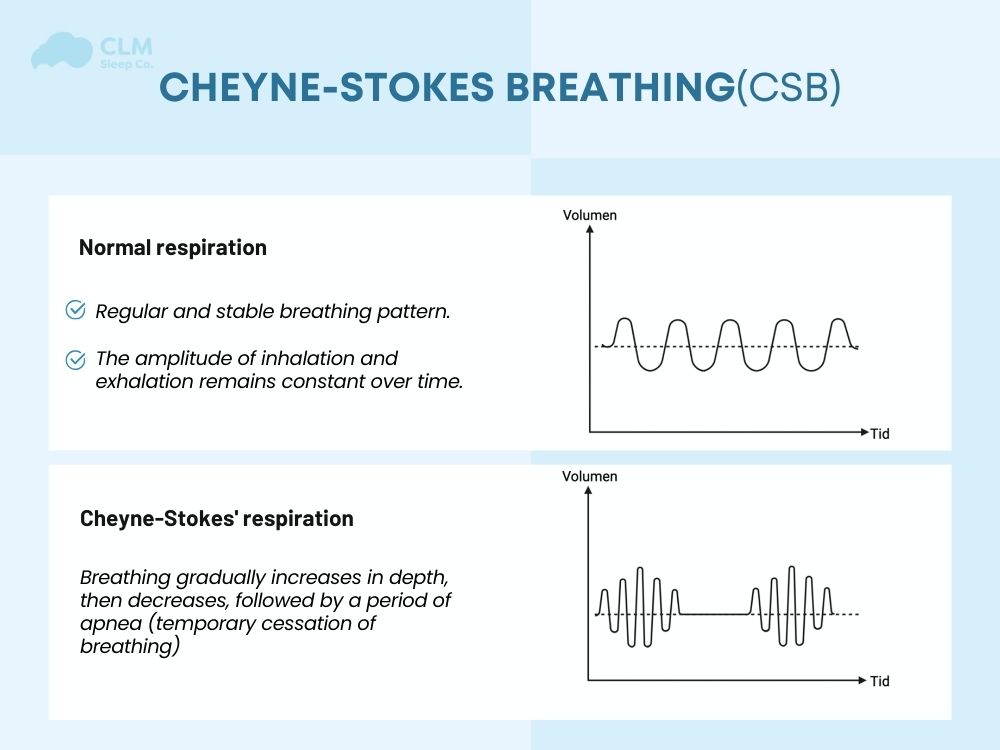
Daytime symptoms
Among the daytime symptoms, excessive daytime sleepiness is the most common, along with morning headaches, difficulty concentrating, and mood disorders. The main cause is interrupted breathing during sleep, leading to poor quality sleep and oxygen deprivation in the body. This significantly affects physical and mental health, as well as the ability to concentrate during daytime activities.
Excessive Daytime Sleepiness
Excessive daytime sleepiness (EDS) is a common symptom of sleep apnea that occurs in approximately 39.9% of people with OSA (Salari et al., 2025). EDS makes patients feel sleepy all the time or even fall asleep during daily activities, even if they have had enough sleep. The cause is that episodes of apnea interrupt the sleep cycle, preventing the body from entering deep sleep. As a result, the body and brain do not have enough time to recover after each night. In addition, pauses in breathing lower blood oxygen levels, making the brain less alert and leading to daytime sleepiness.
Excessive Daytime Sleepiness significantly affects quality of life and work performance, while also having a negative impact on relationships with family, friends, and society. People with EDS are often easily irritated, impatient, have difficulty concentrating, work slowly, less efficiently, and struggle to complete tasks. EDS also reduces alertness and reaction time, thereby increasing the risk of traffic accidents and mistakes in learning and work. In addition, EDS weakens the immune system because of long-term sleep loss and can also cause metabolic problems, which raise the risk of obesity, insulin resistance, and diabetes. Some studies have shown that EDS can be significantly reduced with CPAP treatment, which is the most common and effective method for sleep apnea today.
Read more: How to Recognize Sleep Apnea Symptoms in Women
Fatigue
Fatigue is also a common symptom in patients with sleep apnea, occurring in approximately 39% of cases in the form of pathological fatigue. Unlike daytime sleepiness, fatigue is a feeling of tiredness, lack of energy, and exhaustion both physically and mentally, not necessarily accompanied by sleepiness. The main cause is fragmented sleep due to apnea and hypopnea episodes, preventing the body from reaching the deep sleep stages necessary for recovery. Additionally, repeated episodes of low blood oxygen levels also increase oxidative stress, energy metabolism disorders, and systemic inflammatory responses, contributing to pathological fatigue.
Fatigue directly affects work performance and quality of life. Patients often feel exhausted, have reduced motivation, difficulty concentrating, and impaired short-term memory. In daily life, fatigue makes patients easily fall into a state of lethargy, reducing their interest in work, study, and even recreational activities. This can lead to a breakdown of social relationships and increase the risk of depression and anxiety.
Difficulty Concentrating
Difficulty concentrating is not mentioned as often as Excessive Daytime Sleepiness and Fatigue because it is difficult to measure, but it is also one of the common symptoms in patients with sleep apnea. Difficulty concentrating is a form of cognitive decline related to memory and information processing speed.
Patients will find it difficult to process new information, be easily distracted, forgetful, and require more time to complete tasks or studies. This symptom shares the same causes as excessive daytime sleepiness and fatigue, namely being caused by fragmented sleep, which prevents the brain from getting enough rest, and by reduced oxygen levels, which slow down information processing. Difficulty concentrating significantly affects the quality of life and work or study performance of patients. Difficulty concentrating can cause them to make mistakes at work, learn more slowly, have trouble making decisions, and reduce their problem-solving abilities.
Mood disturbances
Mood disorders are a primary symptom affecting emotions and mental health, including symptoms such as irritability, anxiety, depression, or erratic mood swings. The main cause is repeated sleep disruptions and oxygen deprivation throughout the night, which affects brain regions that control emotions, such as the prefrontal cortex and amygdala.
Read more: Why can’t you sleep? The link between sleep and anxiety
Patients may become easily irritable, impatient, or feel sad or anxious for no apparent reason. For example, frequently getting angry with family and colleagues; experiencing unpredictable mood swings and irritability; feeling lethargic, unmotivated, and having difficulty controlling negative emotions. This symptom can inadvertently affect the patient’s relationships with family, friends, and colleagues. At the same time, it also reduces the quality of life and work performance.
Morning headaches
Sleep apnea and headaches are linked. Many people with sleep apnea wake up with a headache, which makes them feel tense and uncomfortable from the start of the day. This symptom also affects mood, making patients feel less positive when welcoming the new day. Specific symptoms of morning headaches include headaches that appear immediately after waking up, last for several hours, feel dull and heavy in the forehead or temples, and are often accompanied by a dry mouth or sore throat. One likely reason is that breathing problems during sleep cause a drop in blood oxygen levels and a rise in CO₂. This change causes the brain’s blood vessels to widen and increases pressure inside the skull, which can trigger headaches
Dry mouth or sore throat
Dry mouth or sore throat is also a symptom that appears immediately upon waking up, causing a dry, burning, and uncomfortable feeling in the mouth and throat, which may be accompanied by mild hoarseness. These symptoms usually decrease or disappear shortly after waking up. Dry mouth or sore throat occurs when the patient has to breathe through their mouth due to a blocked airway. Breathing through your mouth all night dries out the mucous membranes, causing thirst, dry mouth, or a sore throat when you wake up. This condition is also common in sleep apnea patients using CPAP therapy without a humidifier, especially in dry weather.
Sleep quality–related symptoms
All symptoms in the sleep quality–related group occur at night, disrupting the sleep cycle (sleep fragmentation), leading to reduced deep sleep and REM sleep duration. This reduces the body’s and brain’s ability to recover, leaving the body constantly feeling tired, lacking energy, sleepy during the day, forgetful, and with reduced concentration.
Insomnia and Restless sleep
Insomnia and Restless sleep are conditions characterized by tossing and turning, difficulty falling asleep, frequently changing positions, and waking up multiple times during the night. This disrupts sleep to be interrupted, making it difficult to maintain deep sleep and leaving one feeling as if they haven’t slept at all. Insomnia and restless sleep can occur due to many causes, typically:
- Stress, anxiety, depression.
- Unscientific habits such as using a phone before sleeping, consuming caffeine, tea, or alcohol in the evening.
- Breathing interruptions during sleep
When you stop breathing, the brain will detect a lack of oxygen in the blood, which will wake you up and disrupt your sleep.Additionally, people with sleep apnea are always in a state of anxiety and stress, making it very difficult for them to fall asleep.
Frequent awakenings
Patients often wake up multiple times during the night without knowing why. Some find it difficult to fall back asleep, while others wake for only a few seconds before returning to sleep. Many do not clearly remember how many times they woke up, but they can feel that their sleep was light and of poor quality. This condition occurs because repeated episodes of apnea and hypopnea lower the blood oxygen level, prompting the brain to wake the body in order to reopen the airway.
Non-restorative sleep
Non-restorative sleep is a symptom that can be felt after waking up, even though the person has slept and had enough hours of sleep, they still feel tired, unrefreshed, and lacking in energy. This symptom is quite common and can occur in various sleep disorders, not only in sleep apnea. Non-restorative sleep happens because the sleep is fragmented, disrupting the deep sleep and REM sleep stages, the two critical phases that allow the body and brain to recover and restore energy.
Nocturia
Nocturia is a condition in which a person wakes up one or more times during the night to urinate, leading to interrupted sleep and reduced sleep quality. Besides issues related to the bladder, prostate, diabetes, high blood pressure, or the use of diuretics, nocturia can also be a symptom of sleep apnea. During sleep apnea episodes, breathing stops temporarily, disrupting sleep and stimulating the body to release hormones that increase urine production.
Complications-related symptoms
The symptoms in the complications-related group are the long-term consequences of sleep apnea on the cardiovascular, metabolic, and neurological systems. They do not appear immediately during the night but accumulate over time, increasing the risk of serious diseases and cardiovascular events.
Resistant hypertension
Resistant Hypertension is the most common and serious complication in people with sleep apnea. People with sleep apnea are about 2–3 times more likely to develop high blood pressure compared to those without the condition. The cause stems from a lack of oxygen in the blood (hypoxia) and an increase in CO₂ during apneic episodes, which overstimulates the sympathetic nervous system. The result is an increased heart rate, constricted blood vessels, and a sudden spike in blood pressure during sleep. When this phenomenon repeats hundreds of times each nite, it gradually leads to chronic and resistant hypertension. Notably, among the group of people with resistant hypertension (meaning blood pressure that cannot be controlled despite taking 3 or more medications), up to 70-80% were found to have underlying sleep apnea.
In the long run, resistant hypertension will lead to uncontrollable consequences such as:
- Chronic vascular damage, reducing the elasticity of the vessel walls.
- Increased risk of stroke, myocardial infarction, heart failure, and chronic kidney disease.
- Reduces the effectiveness of blood pressure medication, requiring patients to take higher doses and increasing the risk of side effects.
It increases systemic cardiovascular burden, reduces sleep quality, and increases daytime fatigue, creating a vicious cycle between blood pressure and sleep disorders.
Arrhythmia
Sleep apnea can cause the heart to beat irregularly due to changes in blood oxygen levels. Each time breathing stops, oxygen drops and CO₂ rises, prompting the body to activate the nervous system in an attempt to “wake” the person and restore breathing. This process causes the heart rate to fluctuate, sometimes beating fast, then slowing down, then speeding up again.
Heart rhythm disturbances caused by sleep apnea usually do not occur continuously but tend to happen during sleep or right after sudden awakenings. Therefore, many people are unaware of the condition until it is detected through an electrocardiogram (ECG) or a 24-hour Holter ECG.
If left untreated, sleep apnea–related arrhythmia can increase the risk of stroke and heart failure, and cause symptoms such as fatigue, dizziness, palpitations, and difficulty concentrating during the day.
Specific to OSA
Obstructive Sleep Apnea (OSA) is an all too common condition; it involves the obstruction of air flowing into the body during sleep, and consequently, breathing stops, and oxygen in the blood goes down. Symptoms of OSA awake breathing difficulties are only one type. Below is a classification of these signs sleep apnea:
Sleep apnea symptoms when awake
- Fatigue or Exhaustion: Despite getting enough sleep, you still feel tired upon waking.
- Daytime Sleepiness: This can lead to drowsiness while driving or during other activities.
- Mood Changes: Commonly experienced symptoms include depression and anxiety.
- Cognitive Dysfunction: This sign may include memory loss, difficulty concentrating, and other mental issues.
- Headaches: Frequent headaches upon waking.
- Insomnia: Difficulty maintaining continuous sleep.
- Sexual Dysfunction: Decreased libido or sexual ability.
Sleep apnea symptoms when asleep
- Snoring: Frequent snoring, though not always present.
- Awakening During the Night: Recognizing the reason for waking may be challenging.
- Observed Apnea Episodes: A spouse or family member may notice you stop breathing during sleep.
- Night Sweats: Feelings of dampness and discomfort during sleep.
- Restlessness During Sleep: Frequent movement and difficulty maintaining a comfortable sleeping position.
- Waking with Shortness of Breath: Feelings of choking or difficulty breathing upon waking. This is also one of the common infant sleep apnea symptoms.
If you experience these sleep apnea symptoms, consult a doctor for timely evaluation and treatment.
Specific to CSA
Central Sleep Apnea (CSA) is a form of sleep apnea symptoms in which the brain fails to send the necessary signals to control the respiratory muscles, leading to breathing cessation. The specific symptoms of CSA include:
- Apnea: Episodes of breathing cessation occur during sleep, typically without accompanying snoring.
- Severe Morning Headaches: Headaches upon waking, often due to oxygen deprivation.
- Dry Mouth: Frequent dryness in the mouth upon waking.
- Irritability: Mood may become irritable and easily frustrated.
- Difficulty Concentrating: Reduced attention span and focus in daily activities.
If you have CSA, you may suddenly awaken at night without an apparent reason. The person living with you may notice that you are restless and move around a lot during sleep. If you experience these symptoms, consult a doctor for timely diagnosis and treatment.
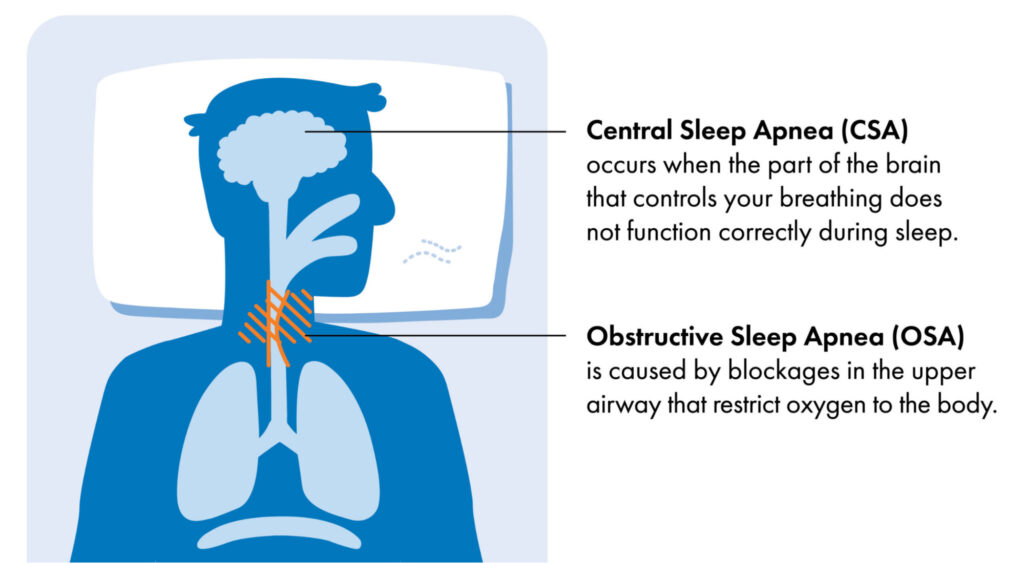
Conclusion
Sleep apnea is a common condition that causes interruptions in breathing during sleep. If left untreated, this condition can lead to severe complications. Therefore, recognizing sleep apnea symptoms is crucial for seeking timely intervention and improving overall health. If you experience loud snoring, gasping for air during sleep, excessive daytime sleepiness, or difficulty concentrating, consult a healthcare provider for appropriate diagnosis and treatment.
The most effective treatments for sleep apnea include the CPAP machine (Continuous Positive Airway Pressure). This device provides a continuous air flow to keep the airway open, preventing apnea episodes and improving sleep quality. To achieve optimal results, it is essential to use the CPAP machine every night. Visit our online store cpapdiscount.au to find suitable solutions for better sleep.
Reference
- Netzer NC, et al. Prevalence of symptoms and risk of sleep apnea in primary care. Chest. 2003 Oct;124(4):1406-14. doi:10.1378/chest.124.4.1406. PMID: 14555573.
- Papagrigorakis MJ, Tzavara C, Theleritis C, Psarros C, Soldatos C, Paparrigopoulos T. The complex interaction between the major sleep symptoms, the obstructive sleep apnea syndrome and sleep-related quality of life. Front Psychiatry. 2021 Feb 25;12:630162. doi:10.3389/fpsyt.2021.630162. PMID: 33614509; PMCID: PMC7947685.
- McNicholas WT. Diagnosis of Obstructive Sleep Apnea in Adults. Proceedings of the American Thoracic Society. 2008 Feb 15;5(2):154–160. doi:10.1513/pats.200708-118MG. PMID: 18250207.
- Svensson M, Franklin KA, Theorell-Haglöw J, Lindberg E. Daytime sleepiness relates to snoring independent of the apnea-hypopnea index in women from the general population. Chest. 2008 Nov;134(5):919-924. doi: 10.1378/chest.08-0847.
- Karnib H, Sheth J, Shelgikar AV. Apnea in New-Onset Heart Failure. Annals of the American Thoracic Society. 2015 Feb;12(11):1725-1729. doi:10.1513/AnnalsATS.201502-084CC.
- Donovan LM, Kapur VK. Prevalence and Characteristics of Central Compared to Obstructive Sleep Apnea: Analyses from the Sleep Heart Health Study Cohort. Sleep. 2016 Jul 1;39(7):1353-1359. doi:10.5665/sleep.5962. PMID:27166235.
- Wang T, Yu FC, Wei Q, Chen L, Xu X, Ding N, et al. Sleep-disordered breathing in heart failure patients with different etiologies. Clinical Cardiology. 2022 Jun;45(7):778-785. doi:10.1002/clc.23840. PMID:35535628.
- Salari N, Gholami A, Jalili F, Zereshki E, Heidarian P, Shohaimi S, Mohammadi M, et al. Global Prevalence of Excessive Daytime Sleepiness in Patients with Obstructive Sleep Apnea: A Systematic Review and Meta-Analysis. Indian Journal of Otolaryngology and Head & Neck Surgery. 2025 Jan;77(1):216-223. doi:10.1007/s12070-024-05146-0. PMID:40066425.
- Bonsignore MR, Pepin JL, Cibella F, et al. Excessive Daytime Sleepiness in Obstructive Sleep Apnea Patients Treated With Continuous Positive Airway Pressure: Data From the European Sleep Apnea Database. Frontiers in Neurology. 2021 Aug 9;12:690008. doi:10.3389/fneur.2021.690008. PMID:34434158.
- Weaver TE, Pepin J-L, Schwab R, et al. Long-term effects of solriamfetol on quality of life and work productivity in participants with excessive daytime sleepiness associated with narcolepsy or obstructive sleep apnea. Journal of Clinical Sleep Medicine. 2021 Oct;17(10):1995-2007. doi:10.5664/jcsm.9384. PMID:34606437
- Waldman LT, Parthasarathy S, Villa KF, Bron M, Bujanover S, Brod M, et al. Understanding the burden of illness of excessive daytime sleepiness associated with obstructive sleep apnea: a qualitative study. Health and Quality of Life Outcomes. 2020 May 7;18:128. doi:10.1186/s12955-020-01382-4.
- Mjelle KES, Lehmann S, Saxvig IW, Gulati S, Bjorvatn B. Association of Excessive Sleepiness, Pathological Fatigue, Depression, and Anxiety With Different Severity Levels of Obstructive Sleep Apnea. Frontiers in Psychology. 2022 Mar 31;13:839408. doi:10.3389/fpsyg.2022.839408. PMID:35432136.
- S Mazza, Pépin J-L, Naëgelé B, at el. Most obstructive sleep apnoea patients exhibit vigilance and attention deficits on an extended battery of tests. European Respiratory Journal. 2005 Jan;25(1):75-80. doi:10.1183/09031936.04.00011204. PMID:15640326.
